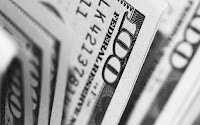The Top 1% Have a Secret
What could very well be the single most important factor that the wealthiest
1% in America share is NOT being born with a silver spoon in their mouths.
No guessing necessary, you’ll find that the primary differentiator
is FINANCIAL EDUCATION.
Say whut? Well, here’s is
what one writer said that pretty well sums it up, what brought this topic to
mind in the first place:
“I
graduated from high school not having been taught the
following:
- How to balance a checkbook
- How to prepare taxes
- What “investing” actually means
- How to set up a brokerage/retirement/checking account
- How to apply for a loan
- How to calculate ROI
- Pretty much everything else related to money”
The root of the problem is that we do
not mandate the education of money business throughout our children’s schooling.
They are supposed to compete in what is now a global economy to earn money and
build a portfolio for the duration of their lives with zero formal preparation.
The wealthiest tycoons who didn’t inherit their net worth, most
likely inherited their parents’ wealth of knowledge on the subject of making
and investing money — which is just as valuable and just as rare.
So, what’s my point here?
Assuming that we’ve agreed upon the importance of the study of
money and on the significant advantages of early education on success in a
given field, the point is very simple: We have to mandate education of
this subject to the children in our public schools.
Maybe you’d say that Financial Education is the job of parents,
not schools. I don’t think so…. How the heck can they teach something they
never learned themselves? OK, that’s not supposed to be an insult -- there’s no
shame in being untrained financially any more than there is in being unable to
teach Biology, Physics, English Literature, Algebra etc.
BUT, as it is, the children of the financially illiterate will one
day be forced out into the real world to compete with the children who were
given an education on money. Even if
they don’t jump to the 1%, I’m willing to bet they will be closer, and their
children even closer with each subsequent generation.
Of course the other traditional core subjects are important, but
they need to be squeezed, shortened, or otherwise reduced to give personal
finance education just as much priority, making it a core subject in our
childrens’ education, just like language, math, and science.
It really should not be that hard. Finance curricula have
already been produced and are part of the catalog of classes that school
districts can draw from for their programs. The issue is that they generally do
NOT use them. And there is no mandate from most states to incorporate them.
They may think they do by offering “Economics” -- here are a few
items from a state Economics curriculum plan:
- free enterprise, socialist, and communist economic systems.
- the right to own, use, and dispose of private property.
- the interaction of supply, demand, and price.
- the reasons for international trade and its importance to the United States and the global economy.
- the issues of free trade and the effects of trade barriers.
Another state curriculum plan does address “Personal Financial
Literacy “, in part including:
- types of business ownership
- the role of financial markets/institutions in saving, borrowing, and capital formation
- the role of individuals in financial markets
- costs and benefits of personal financial decisions
- how to provide for basic needs while living within a budget
- methods available to pay for college and other secondary education and/or vocational training.
So what can we do about it? Pressing our school districts to do the job
right is a start, but you know as well as I do, it will be an uphill battle
just because of inertia and resistance to change. It will take some time, so what about
NOW? Give the kids an allowance (or do
they “work” for it?) then take them shopping to teach them how to spend it? Ummmm….. no, no, no and no. A good start is teaching those basic things in
the first list above, things we very likely had to teach ourselves. Then we may need to do some studying of our
own to proceed to the more “advanced courses.”
There are two major impacts to be seen from improving
financial education, first, individually for the children who will have an
advantage in their futures and secondly, strengthening the US national economy.
What do you think? Do you have Personal Finance Literacy
available in your schools? Are you
teaching your children? Were YOU taught?
Primary Source: Scott Trench | BiggerPockets.com
Wherever you fit in the wealth spectrum I'd be glad to help you with your real estate interests to take the best advantage of what you have. CLICK HERE and I'll get started!
PS- If you have any friends, family, coworkers or neighbors who may be interested in buying or selling a home or other property, please forward my contact information to them.
Thanks!
Please visit my website jimatthetop.com for a wealth of information and how-tos covering buying and selling real estate, Houston area communities and neighborhoods, financing, helpful resources and more.
http://jimatthetop.com
jimpedicord@remax.net
281-610-7847 Cell/Text
713-558-2537 Direct
713-773-3700 x 2537 Office
713-773-3311 Fax
JIM AT THE TOP
Jim Pedicord RE/MAX Top Realtyjimpedicord@remax.net
281-610-7847 Cell/Text
713-558-2537 Direct
713-773-3700 x 2537 Office
2911 S. Sam Houston Pkwy. E. Houston, TX 77047





Comments
Post a Comment